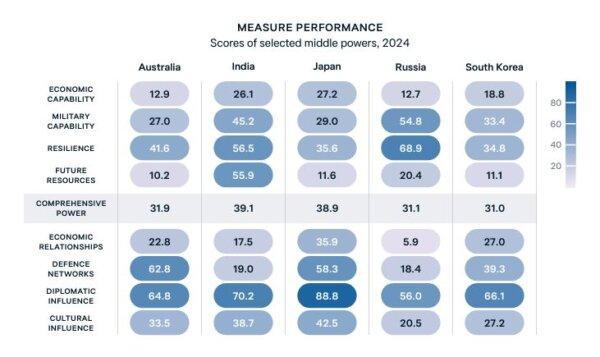Australia has risen in the Lowy Institute’s annual Asia Power Index—but only because the influence of other states have fallen.
Australia has risen to rank among the five most influential powers in Asia—behind the United States, China, India and Japan.
Despite newly signed defence agreements with countries in the region, increased military engagement, and a commitment of $368 billion to AUKUS, the country’s move upward has only occurred because others are faltering.
The Lowy Institute’s annual Asia Power Index ranks 27 countries and territories in terms of “what they have and what they do with what they have.”
It encompasses as far west as Pakistan, as far north as Russia, and as far into the Pacific as Australia, New Zealand, and the United States. The 2024 edition covers six years of data.
Australia’s advancement is only the second time it’s moved up the Index. It surpassed South Korea in 2020.
Australia has risen one place in the ranking, at the expense of Russia, and—despite all the effort described above—is characterised as merely “holding its own” in terms of power and influence.
The ranking is calculated across several factors, grouped under “resources” and “influence.”
The first four measures—economic capability, military capability, resilience, and future resources—are the resources countries need to exercise power. The next four—economic relationships, defence networks, diplomatic influence, and cultural influence—assess how much sway one country holds over the others in the region.
Australia Weak on Military and Economic Capability
Australia scores highly on defence networks, below only the United States on “ alliances, regional defence diplomacy, and arms transfers.”
It falls near the middle on economic relationships, in sixth place thanks to its success in securing trade agreements throughout the Indo-Pacific.
But on diplomatic influence—defined as “the capacity to exercise leverage through economic interdependencies; measured in terms of trade relations, investment ties, and economic diplomacy”—it comes in seventh place.
It ranks even worse on both military and economic capability, at eighth position, and ninth on future resources (defined as “the projected distribution of future resources and capabilities, which play into perceptions of power today.”).

While the low ranking in some key markers may be of concern, the Institute concludes that “the fact that Australia’s power is holding steady contradicts a more pessimistic view that over time, it will become a smaller and less relevant player as other much larger economies rise.”
The report also delivers a hit to the government’s aspirations to become a key supplier in the “green economy.”
“Australia suffered a decline in resource security, driven by a worsening energy trade balance. Australia’s rare earth exports were also slightly lower in both relative and absolute terms, suggesting that its goal of becoming a globally diversified supplier of materials used for clean energy technology remains an aspiration rather than a reality,” it said.
The country has proved more resilient across the factors used to measure influence, trending upwards for diplomatic and cultural influence and economic relationships. Its score for defence networks dropped slightly, but its second-place rank remained unchallenged.
Overall, the Institute’s outlook for Australia’s continued ability to play a decisive role in the Indo-Pacific is positive.
“Australia’s positive ‘power gap’—the degree to which it has influence outstripping its resources—increased in the 2024 Asia Power Index,” the report notes.
“This finding suggests that Australia need not fear irrelevance in Asia in the years to come if it can continue to make sound decisions and leverage its capabilities creatively to achieve its goals.”
Russia’s Dip
Russia’s fall in the ranking is attributed to its invasion of Ukraine, which the Institute says is “having deeply unfavourable repercussions for its power in Asia.” It suffered a three-point loss for diplomatic influence, taking the 10th position.
“Spurred on by its war economy and new investments in its defence industry, Russia’s GDP grew strongly over the past year. Yet the report says that the 2024 Asia Power Index attests to deep weaknesses beneath the surface for Russia’s economic capability and resilience,” the report says.
“Against this backdrop, Putin’s 2024 visits to China, North Korea, and Vietnam look more like an effort to shore up Russian influence than an indicator of continued relevance. For the most part, Russian resources remain committed to the European theatre, not to Asia.”
Other Nations
But while there may be a few quiet celebratory drinks in Canberra, there’s no cheer for Wellington.
New Zealand has lost 14 percent of its comprehensive power since 2018 and is one of only three countries—alongside Russia and war-torn Myanmar—to decline in overall power in this year’s Index.
While New Zealand suffered small losses in several measures, its main reduction in power is traceable to a drop in diplomatic influence and less extensive defence networks.
New Zealand’s diplomatic influence has declined steadily since 2019, sliding from 11th in 2021 to 15th in 2024. It is now 13th overall in the Index.
A similar trend is evident for its performance in the defence networks measure, where it has lost 11 points compared to 2018.
Wellington has largely been left behind by the quickening pace of Asia’s defence diplomacy.
Other trends noted by the Lowy Institute: India has overtaken Japan to become the third-ranked power in Asia, but its clout remains below the potential promised by its resources; the United States has bolstered its standing in Asia, although it is losing ground to China on military capability; and China’s power is neither surging nor collapsing, but rather plateauing at a level below that of the United States, but still well above any Asian competitors.
Beijing’s overall power score increased by just 0.2 points in 2024, contrasting to most Asia Power Index countries, whose scores rebounded more strongly following the COVID-19 pandemic. This weak growth means the gap between China and the United States is the largest since 2018.

